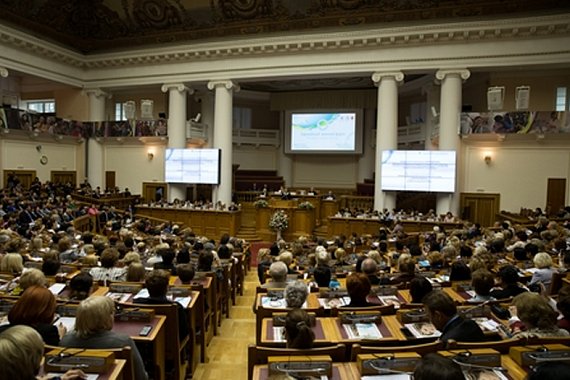Eurasian Women's Forum Towards Peace, Harmony and Social Well-being (24 September 2015)

Speaker Matvyenko, distinguished panellists, Ladies and gentlemen,
Thank you for inviting me to speak. I am delighted to join this path-breaking event and discussion, which aims “Towards Peace, Harmony and Social Well-Being.”
At a time when the global economy is still struggling to regain its footing after the massive financial crisis and other economic shocks, and with a new generation of wars and unrest and flows of desperate people around the world, the need for such a discussion and for new approaches is clear and is urgent. Gathering women (and men) from across the Eurasian space—who have been joined by guests and participants from more than 80 countries--for this discussion reflects the evolving economic and political disposition of power and interests across the globe. The new political and economic realities require new approaches and new groupings, which can both reflect on the specific achievements and challenges in their own regions and at the same time discuss ways to advance the interests of all.
The discussion of Peace, Harmony and Social Well-Being is very much in line with the core mandate of the International Labour Organization, which is expressed in its preamble: “Universal and lasting peace can be established only if it is based upon social justice”.
What is social justice? Social justice includes economic well-being, based on fair rules and equal treatment. It must include the possibility for all people to participate in their societies, economies and political life in meaningful—and equal--ways. Equal opportunity, equal treatment, and ultimately equal outcomes for all people includes all classes, all races and nationalities; and it must be built on a foundation of equality between women and men.
On this fundamental dimension, Russia and most of the CIS countries and many others present at this forum perform relatively well, well, that is, compared to a world where gender equality still remains a goal rather than a reality. Let me mention three spheres in which we can assess the status of women: the political sphere, the social sphere and the economic sphere.
With regard to the political sphere, in most CIS countries, there is a positive trend of steadily increasing numbers of women as legislators, senior officials and managers. Overall in most CIS countries, women hold more than 30 % of these top positions, above the global average. And of course in the Russian Federation, a woman—Speaker Matviyenko—has served as the president of the upper house since 2011. Nonetheless, there is still much room for improvement to come to full gender parity. Some CIS countries have adopted gender quotas to increase women’s formal political participation, which have helped, but not yet closed the gaps.
Turning to the social sphere, women’s full participation depends highly on equal education. And there is good news here both regionally and at the global level. Today in most regions women equal or even outnumber men as university graduates and this is true in many CIS countries, as well. In Russia, 60% of adult women have attained tertiary education, which is the highest percentage in any G20 country. The high education rates of women reflect a longstanding policy and culture that emphasizes not only gender equality but also a strong emphasis on education for the entire population. This is something of which the region should be proud, and it should recognize, preserve and build upon this historical progress.
Turning to women’s participation in the economy, addressing gender inequality in employment is a key pathway to reducing inequality in other spheres. Women’s sustainable political and social empowerment is dependent on their economic empowerment. What has been happening in this region?
In the Russian Federation, over 68% of working age women participate in the labour force, which places it in the top five G20 countries in these terms. And in Russia, Azerbaijan and Kazakhstan, more women have entered the labour market over the last twenty years, and at a higher rate than men. Women’s average labour force participation rates in CIS countries is 54.5%, which is better than the global average, and the gender gaps in labour force participation in CIS countries are smaller than the global gender gap. However the labour force participation rates for working age women in over half of CIS countries have decreased over the last twenty years and it is important to take steps to reduce these downward trends where they exist, so as not to lose the relatively high level of women’s participation that was built up over earlier decades.
Time does not permit in this session, but it is also important to look at the quality of jobs, the gender pay gap and coverage of social benefits. I and my ILO colleagues will address these issues in the panel discussions today and tomorrow.
Ladies and gentlemen, gender equality, women’s empowerment and women’s leadership are essential ingredients of peaceful, harmonious societies and social well-being. The Russian Federation and CIS countries have a strong historical foundation and achievements, but they must be guarded and adapted to contemporary economic and social circumstances. Gender equality is a continual work in progress. This conference is an excellent opportunity to ponder these questions and to develop creative national and regional solutions.
I would like to assure you that the insights and messages from our discussions will also inform ILO efforts to build strong gender equality dimensions at the international level, including within the G 20 and BRICS frameworks, and we will work closely with your governments and social partners in advancing this objective.
I hope for fruitful, creative and productive discussions over these days!
Thank you.

